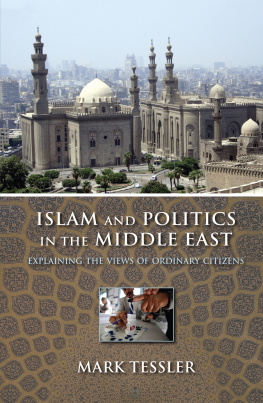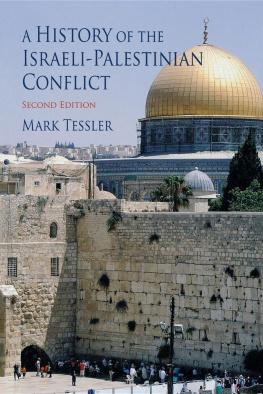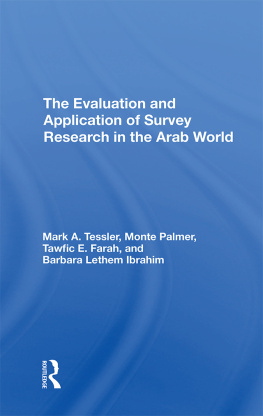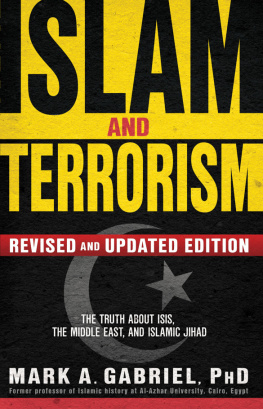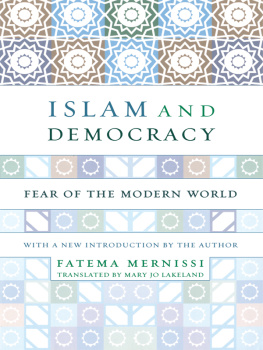This book is a publication of
Indiana University Press
Office of Scholarly Publishing
Herman B Wells Library 350
1320 E. 10th Street
Bloomington, IN 47405-3907
iupress.indiana.edu
Telephone orders 800-842-6796
Fax orders 812-855-7931
2015 by Mark Tessler
All rights reserved
No part of this book may be reproduced or utilized in any form or by any means, electronic or mechanical, including photocopying and recording, or by any information storage and retrieval system, without permission in writing from the publisher. The Association of American University Presses Resolution on Permissions constitutes the only exception to this prohibition.

The paper used in this publication meets the minimum requirements of the American National Standard for Information SciencesPermanence of Paper for Printed Library Materials, ANSI Z39.48-1992.
Manufactured in the United States of America
Cataloging information is available from the Library of Congress.
ISBN 978-0-253-01643-0 (cloth)
ISBN 978-0-253-01657-7 (ebook)
1 2 3 4 5 20 19 18 17 16 15
Preface
I WAS INTRODUCED to questions about Islam and its place in Muslim society and political affairs when studying, many years ago, at the University of Tunis. The curriculum in the year-long program leading to a certificat in Sociologie Maghrbine et Islamique included courses with prominent Tunisian professors and a chance to interact in a classroom setting, and on campus, with Tunisian university students. One of my courses, the title of which was something like Islam in Theory and Society, was taught by Professor Abdelwahab Bouhdiba and focused on many of the topics that Bouhdiba would later explore in his writings. Among these were Islam and social change, sexuality in Islam, and Islam and criminality.
My experience in Tunisia beyond the university also deepened my early interest in Islam. Under the leadership of its charismatic and determinedly modernist president, Habib Bourguiba, Tunisia was carrying out a bold program of reform that had implications for the place Islam would occupy in public life. Reforms included the promulgation of a personal status code that challenged traditional interpretations of Islamic law in family affairs and gave men and women equal rights in a number of areas. This was, and remains today, the most progressive body of family law of any Arab country.
Bourguibas government also challenged the way that Islamic endowments and trusts were administered; and in one of his most notable and controversial actions, he called for Tunisians to refrain from fasting during Ramadan if this would reduce their effectiveness at work. Bourguiba argued that the country was in a war against underdevelopment and that Islam exempts warriors from fasting when in battle. Among Bourguibas many speeches dealing with Islamic themes was one, made during the time I was in Tunisia, in which he told his countrymen, Faith and spiritual values are only effective to the extent they are based on reason.
But Bourguibas was not the only Tunisian voice speaking about Islam at the time; and although there were many other Tunisian advocates of reform during this period, there were also those who opposed the presidents modernist project in the name of fidelity to a proper understanding of Islam and its place in a Muslim society. These individuals called the presidents message misguided and harmful, however well intended it might be. Some also charged that Bourguibas actions were politically calculated and that their true purpose was to reduce the influence of institutions that might challenge his authority and the dominant position of the political party he led.
This first year in Tunisia was spent while I was a doctoral student in political science at Northwestern University. I had completed my first year of study at Northwestern when the opportunity to spend a year at the University of Tunis unexpectedly presented itself. Like my experience in Tunisia, the graduate program at Northwestern introduced me to things with which I had previously been unfamiliar and that were soon to become part of my continuing scholarly interest. When I told my undergraduate advisor that I had accepted an NDEA fellowship from Northwestern and would be studying political science there, he replied that I had chosen a very behavioral department. This is a term with which I was completely unfamiliar at the time, but I soon learned that it referenced an approach to scholarly inquiry that included an emphasis on formulating and testing hypotheses that seek to account for variance and on the collection and analysis of quantitative (and other) data. Northwestern had one of a small number of departments that were in the forefront of the behavioral revolution in political science in the 1960s.
Survey research and the study of public opinion were an important part of the training I received at Northwestern, and with this began a lifelong professional interest in the attitudes and behavior of ordinary men and women. My first-year paper at Northwestern was based on a survey; and during my second year, spent in Tunisia, it was perhaps natural that I would seek to supplement my coursework and travel around the country by conducting a survey of Tunisian students. Items on my questionnaire asked respondents to indicate the extent to which, using a 10-point scale, they agreed or disagreed with statements like It is necessary for contemporary Islam to take steps to modernize further.
Some of the questions I asked in the student survey seem nave in retrospect. But these were formative experiences that reflected a coming together of my interest in questions about the proper role of Islam in present-day Muslim society and in the way that ordinary citizens were processing and evaluating different and often conflicting messages about these questions. Thus, after returning to Northwestern for another year of study, I returned to Tunisia for dissertation research. Over the course of the next year, I conducted face-to-face interviews with a large stratified sample of men and women in Tunis and three small towns in different parts of the countries. Questions about Islams place in public life occupied an important place on my interview schedule, along with questions about womens status and other political and social issues. My findings were later published in my book Tradition and Identity in Changing Africa., coauthored with William OBarr and David Spain (1973).
Fast forward to the present and it is clear that these questions about Islam and its place of political and social affairs have never gone away. They are on the agenda today; and with many ups and downs, many of which are described in the present volumes introductory chapter, this has been the case in the Middle East The days of Bourguiba and other advocates of radical reform, or sometimes even secularism, seem very far away. And a lot has also happened in Tunisia and Egypt and other countries touched by the events of the Arab Spring since the heady and hopeful days of 2011. But between my first years in Tunisia and the present, public discourse, and disagreement, about Islams role in public life has for the most part been a constant, with considerable variation in the views of ordinary citizens not only across the Muslim-majority countries of the Middle East and North Africa but also, and even more, within these same countries. Although the data on which the research in this book is based only go back about a decade and half, they show, as do those from my earlier surveys in Tunisia and a few other countries, that questions about the proper relationship between Islam and politics are contested, with division more common than consensus on many of the relevant issues.

 The paper used in this publication meets the minimum requirements of the American National Standard for Information SciencesPermanence of Paper for Printed Library Materials, ANSI Z39.48-1992.
The paper used in this publication meets the minimum requirements of the American National Standard for Information SciencesPermanence of Paper for Printed Library Materials, ANSI Z39.48-1992.
